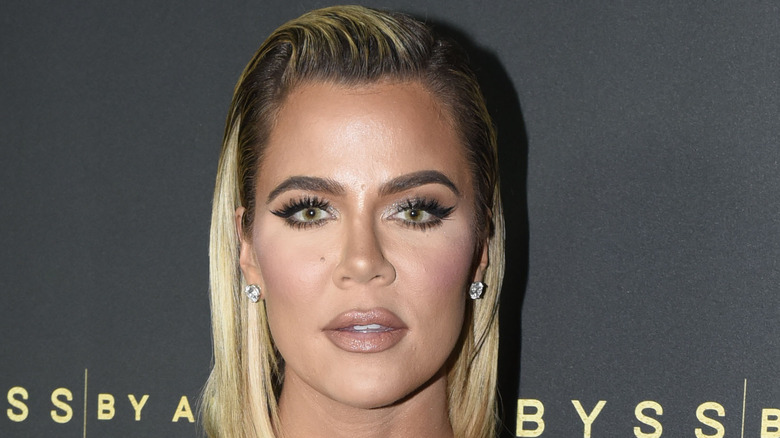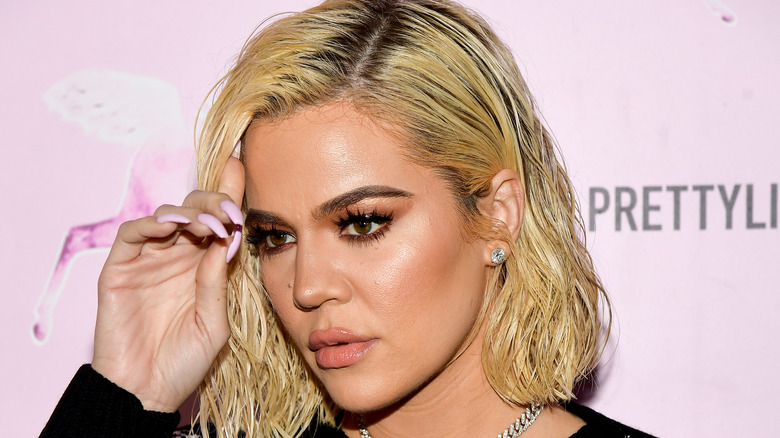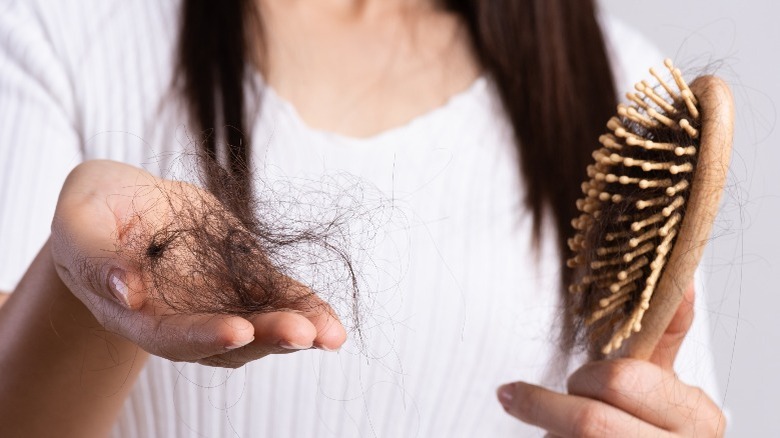Khloe Kardashian's Hair Loss Side Effect Of COVID-19 Explained
"Keeping Up with the Kardashians" star Khloé Kardashian spoke publicly about the hair-raising experience she had with hair loss while suffering from COVID-19. Khloé took to Twitter Spaces and chatted with fans about dealing with the side effect (via People). "My hair really fell out with COVID," Khloé shared, noting that she contracted the virus near the beginning of the pandemic, around March 2020. "So after, it was really a struggle for a minute."
The topic arose as the reality TV celeb was talking about the beauty and wellness brand Dose & Co., for which Khloé is a global spokesperson. Khloé, who is also the co-founder of the environmentally conscious and inclusivity-focused clothing brand Good American, explained that taking Dose & Co collagen powder was extremely helpful in mitigating her hair loss issues that resulted from COVID-19.
The final season of "Keeping Up with The Kardashians" highlighted Khloé Kardashian's struggles with COVID-19. Self-quarantining as she awaited the official results of her COVID-19 test, she described feeling as though she was hit by "a ton of bricks" (via Self). Soon after, her diagnosis was confirmed.
The science behind COVID-19 and hair loss
Khloé Kardashian is not alone in experiencing hair loss due to COVID-19. "Charmed" alum Allyssa Milano, who contracted COVID-19 in April 2020, tweeted a video later that summer where she revealed clumps of hair in her brush. The Centers for Disease Control and Prevention does not list hair loss as an official side effect of COVID-19, however, the website states that the list continues to evolve as experts confirm more of the virus' side effects.
Nevertheless, there are indicators that hair loss and COVID-19 are in some way related. Besides a survey conducted by Survivor Corps, where nearly 35% of the 1,700 participants suffering from long-haul COVID reported hair loss, health professionals also acknowledge a relationship. "There's been at least a 25 percent increase in people coming in with hair loss," Dr. Dendy Engelman, a dermatologist at Manhattan Dermatology & Cosmetic Surgery, told Healthline. "It's not yet documented on major medical sites as a symptom, but patients show me their positive test results," Dr. Engelman added.
Doctors believe that COVID-19 is a stressor that can lead to a temporary form of hair loss called telogen effluvium. "When there's a shock to the system, the body goes into lockdown mode and only focuses on essential functions. Hair growth is not as essential as other functions, so you end up with hair shedding," Dr. Susan Massick, a dermatologist at the Ohio State University Wexner Medical Center, explained to Healthline.
Managing hair loss
While the CDC does yet list hair loss as a COVID-19 side-effect, a study published in the medical journal, Nature Public Health Emergency Medicine concluded that telogen effluvium can be caused as a result of becoming infected with COVID-19. The study took place between September 2020 and March 2021 and included 39 participants between the ages of 22 and 67. Despite only experiencing moderate COVID-19 symptoms, their hair loss was excessive, beginning two months after they had been infected.
According to the experts at Medical News Today, if you are experiencing a severe case of telogen effluvium, some home remedies can help promote hair growth. For instance, taking a red ginseng supplement has been shown to be effective. Researchers do not yet know the full reasons, and it is best to check with your doctor first to see if taking red ginseng supplements is safe for you — especially if you are taking other medications. They also point out that mixing in small amounts of geranium oil or coconut oil into your hair care products may help get you some results. Studies have also shown that using rosemary oil for six months may also help you regrow your hair; however, you may experience an itchy scalp, which is reportedly one of the side effects.
If none of these methods work or if your hair loss is moderate, your hair should grow back naturally in six to nine months. In the meantime, while the health experts at Medical News Today suggest trying home remedies and lifestyle changes, they caution against using unvetted hair growth supplements. Dr. Engelman holds the same position. "There aren't many hair supplements that are vetted in science, and these companies know people are desperate, so they'll make crazy claims," Dr. Engelman told Healthline. However, if you are not seeing any improvement after six months despite trying safe methods, it may be time to consult your dermatologist.



